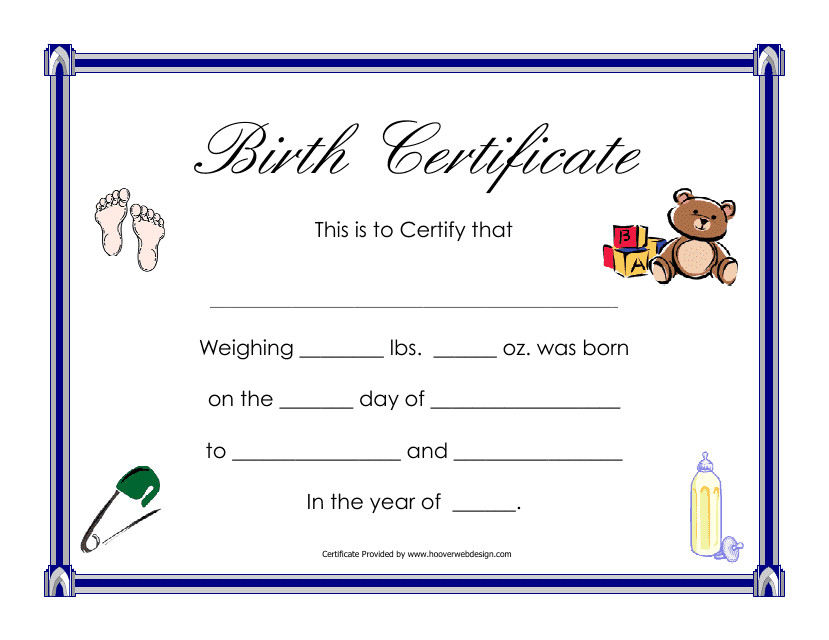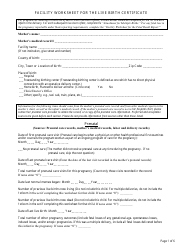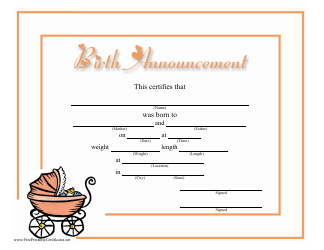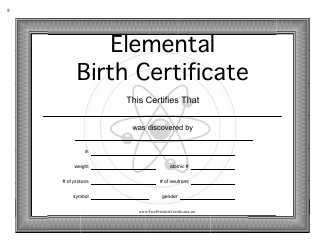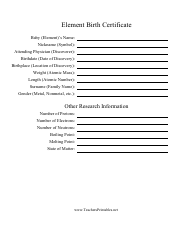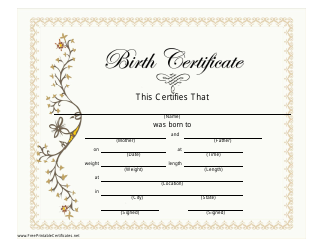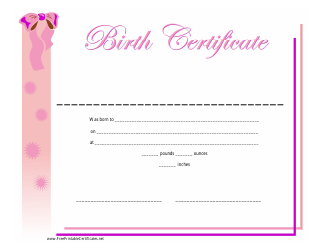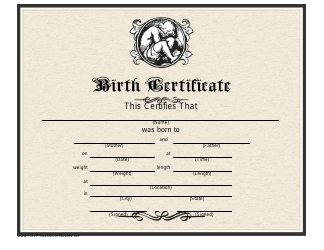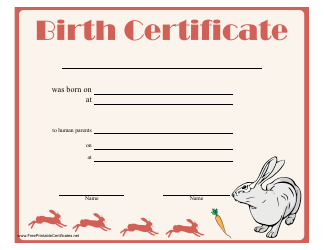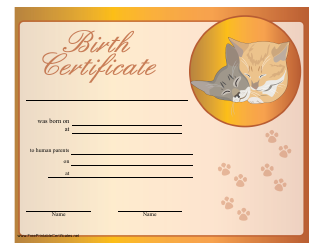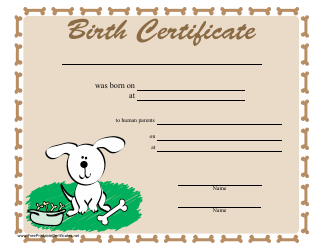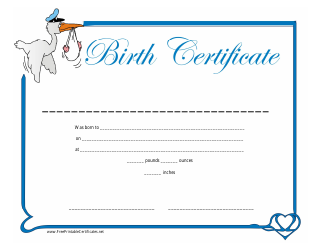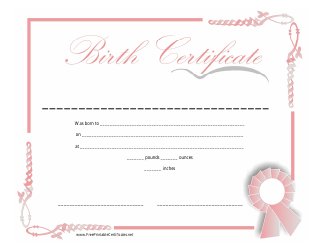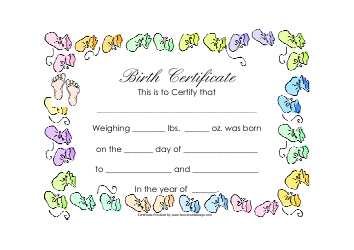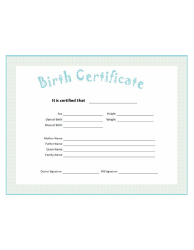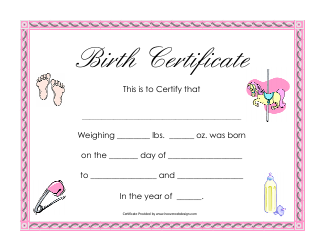Birth Certificate Template - Bear
A Birth Certificate Template - Bear is a template used to create birth certificates that feature a bear design. It is often used as a decorative and personalized option for documenting and commemorating a child's birth. However, it is important to note that the actual birth certificate issued by the government is a separate legal document.
FAQ
Q: What is a birth certificate?
A: A birth certificate is an official document that proves a person's birth and identity.
Q: Why do I need a birth certificate?
A: A birth certificate is often required for various purposes such as obtaining a driver's license, passport, social security card, and enrolling in school.
Q: How do I get a birth certificate?
A: You can usually request a birth certificate from the vital records office in the state where you were born. Each state has its own procedures and requirements.
Q: What information does a birth certificate contain?
A: A birth certificate typically includes information such as the person's full name, date and place of birth, parents' names, and sometimes other details like the attending physician.
Q: Can I use a birth certificate template to create my own birth certificate?
A: No, using a fake or unofficial birth certificate template is illegal and can result in serious consequences. Only use official birth certificates issued by the appropriate government authorities.
Q: Can I obtain a birth certificate for someone else?
A: In most cases, you can only request a birth certificate for yourself, your child, or a deceased relative. There are usually specific eligibility requirements and authorization needed to obtain someone else's birth certificate.
Q: What should I do if I lost my birth certificate?
A: If you lost your birth certificate, you can typically request a replacement from the vital records office in the state where you were born. There may be a fee and specific procedures to follow.
Q: Are birth certificates the same in the USA and Canada?
A: Birth certificates may vary in format and information between the USA and Canada, as each country has its own standards and regulations.
Q: Can I use a birth certificate for identification?
A: Yes, a birth certificate is often accepted as a form of identification for various purposes such as obtaining a driver's license or applying for a passport.
Q: How long does it take to get a birth certificate?
A: The processing time for obtaining a birth certificate can vary depending on the state or province. It usually takes a few weeks to receive it.
Q: Do I need to have my birth certificate translated if it's not in English?
A: If your birth certificate is not in English, you may need to have it translated by a certified translator before using it for official purposes.
Q: Can I make changes to my birth certificate if there are errors?
A: If there are errors on your birth certificate, you can typically request corrections or amendments from the vital records office where it was issued. There may be specific procedures and requirements for making changes.
Q: Do I need a birth certificate to get married?
A: Yes, a birth certificate is often required when applying for a marriage license to prove your age and identity.
Q: Can a birth certificate be used as proof of citizenship?
A: While a birth certificate is a vital record, it is not sufficient proof of citizenship. To prove citizenship, you may need additional documents such as a passport or naturalization certificate.
Q: Can I use a photocopy of my birth certificate?
A: In general, photocopies of birth certificates are not accepted as valid proof. You usually need an original or certified copy of your birth certificate.
Q: How much does it cost to get a birth certificate?
A: The cost of a birth certificate can vary depending on the state or province. There is usually a fee involved for processing and issuing the certificate.
Q: Can I get a birth certificate if I was adopted?
A: If you were adopted, your birth certificate may have been amended to reflect your adoptive parents' information. You may need to contact the adoption agency or vital records office for information on obtaining your birth certificate.
Q: What is a long-form birth certificate?
A: A long-form birth certificate is a more detailed version of a birth certificate that includes additional information such as the parents' occupations, place of birth, and other details.
Q: How long are birth certificates valid?
A: Birth certificates do not have an expiration date and are generally considered valid throughout a person's lifetime.
Q: Can I get a birth certificate if I was born abroad?
A: If you were born abroad to U.S. citizen parents, you can usually obtain a Consular Report of Birth Abroad (CRBA) from the U.S. Embassy or consulate. This document serves as a birth certificate for U.S. citizens born abroad.
Q: Who has access to my birth certificate?
A: Access to birth certificates is usually restricted to the individual named on the certificate, their parents, legal guardians, or authorized parties. Some states may have additional restrictions on access.
Q: Can I use a birth certificate for genealogy research?
A: Yes, birth certificates are commonly used for genealogy research as they provide valuable information about a person's birth and parentage.
Q: What is a certified copy of a birth certificate?
A: A certified copy of a birth certificate is an official copy that has been issued by the appropriate government authority and is recognized as a legal document.
Q: Can I get a birth certificate if I was born on a U.S. military base?
A: If you were born on a U.S. military base, you can usually obtain a birth certificate from the vital records office of the state or country where the base is located.
Q: Do I need a birth certificate for healthcare purposes?
A: While a birth certificate is not typically required for routine healthcare purposes, it may be needed for certain situations such as enrolling in health insurance or accessing certain medical services.
Q: Can I get a birth certificate for a stillborn child?
A: In most cases, a stillborn child can be issued a birth certificate. The process and requirements may vary depending on the jurisdiction.
Q: Can I get a birth certificate for a home birth?
A: If you were born at home, you may need to follow specific procedures to obtain a birth certificate. You may need to provide additional documentation and have the birth registered with the appropriate government authorities.
Q: Can a birth certificate be used to prove paternity?
A: A birth certificate can indicate the legal father of a child, but it may not necessarily establish biological paternity. Paternity tests and legal procedures may be required to establish biological paternity.
Q: Can I get a birth certificate if I was born in a foreign country?
A: If you were born in a foreign country, you may need to contact the appropriate government agencies or embassy/consulate of your home country to obtain a birth certificate.
Q: Can I use a birth certificate for immigration purposes?
A: A birth certificate may be used as part of the documentation required for immigration purposes, but additional documents or forms may be necessary depending on the immigration process.
Q: Can I get a birth certificate for a relative who has passed away?
A: In most cases, you can request a birth certificate for a deceased relative if you can prove your relationship and have a valid reason for needing the certificate. There may be specific procedures and requirements to follow.
Q: What is an apostille for a birth certificate?
A: An apostille is a form of international certification attached to a birth certificate to verify its authenticity and make it legally valid in countries that are part of the Hague Convention.
Q: Can I use a birth certificate to change my name?
A: In some cases, a birth certificate can be used as proof of identity when changing your name. However, specific name change procedures may vary depending on your jurisdiction.
Q: Can I use a birth certificate to prove my age?
A: Yes, a birth certificate is often accepted as official proof of age for various purposes such as obtaining a driver's license, entering school, or getting a job.
Q: Can I get a birth certificate if I am undocumented?
A: The process for obtaining a birth certificate may vary for undocumented individuals. You may need to consult with legal experts or organizations specializing in immigration matters for guidance.
Q: Can I use a birth certificate as a form of photo ID?
A: No, a birth certificate typically does not include a photograph and is not considered a valid form of photo identification. You may need a separate government-issued ID with a photo.
Q: What is a short-form birth certificate?
A: A short-form birth certificate, also known as an abstract or certification of birth, contains basic information about a person's birth, usually without detailed parental information.
Q: Can I get a birth certificate for my adopted child?
A: If you have legally adopted a child, you can usually request an amended birth certificate that reflects their new name and your information as the adoptive parent. The process may vary depending on the jurisdiction.
Q: Can I use a birth certificate to prove my citizenship?
A: A birth certificate is considered evidence of U.S. citizenship for individuals who were born in the United States or certain U.S. territories.
Q: Can I get a birth certificate if I was born at sea?
A: If you were born at sea aboard a U.S. vessel or aircraft registered in the United States, you may be eligible for a Consular Report of Birth Abroad (CRBA) from the U.S. Department of State.
Q: Can I get a birth certificate if I was born before 1900?
A: The availability of birth certificates for births that occurred before 1900 may vary depending on the jurisdiction and record-keeping practices of that time period. Some older birth records may be accessible through historical archives.
Q: Can I get a birth certificate for my grandchild?
A: In most cases, only the child's parent or legal guardian can request a birth certificate. You may need to provide legal documentation proving your relationship and authorization.
Q: Can I request a birth certificate from a different state?
A: Yes, you can usually request a birth certificate from a different state if you were born there. However, you will need to follow the procedures and requirements of the state where the birth occurred.
Q: Can I get a birth certificate if I was born outside of the United States but one of my parents is a U.S. citizen?
A: If you were born outside of the United States to at least one U.S. citizen parent, you may be eligible for a Consular Report of Birth Abroad (CRBA) from the U.S. Department of State. This document serves as a birth certificate for U.S. citizens born abroad.
